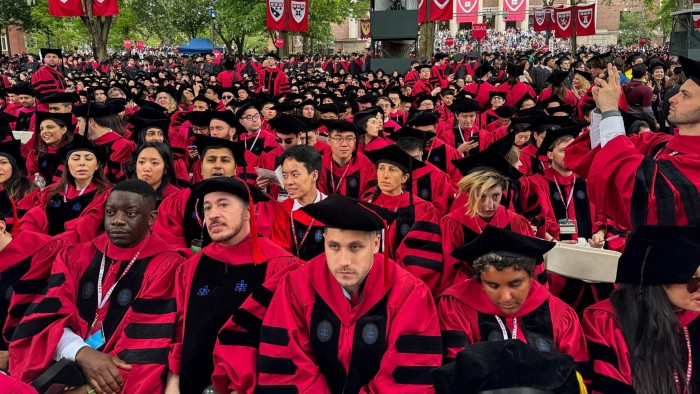Unlock the White House Watch newsletter for free
Your guide to what Trump’s second term means for Washington, business and the world
Harvard has been in talks with leading US and international universities to temporarily house its foreign students facing bans under Donald Trump’s clampdown on the college.
Leaders from the University of Chicago and the London Business School are among those who have held discussions on accommodating students accepted for the coming academic year at Harvard, but who are now at risk of being denied visas, according to academics at the institutions.
Other US universities are examining ways to help their own current and incoming foreign students, including relocating them to campuses outside the country.
The Trump administration has banned Harvard from accepting foreign students as part of its broader campaign against what it claims is liberal bias and antisemitism on American campuses. A judge temporarily froze the order last week, delaying Trump’s actions.
The administration has suspended the review of all visa applications from prospective students seeking to study anywhere in the country as it steps up background checks, including going through social media. It has also revoked visas and detained foreign students who it claims have been involved in protests, mainly against Israel over its war with Hamas in Gaza.
The campaign risks cutting funding for institutions which have grown reliant on fee income from the more than 1.1mn foreign citizens studying in the US. The majority of these students are from China and India. Foreign students are estimated to generate economic benefits of $45bn a year, according to the Department of Commerce.
NAFSA, a network of universities and individuals engaged in international education, criticised “an unacceptable assault on an already thorough screening and monitoring process [which] creates a climate of uncertainty and fear.”
Amit Sevak, head of ETS, which runs the largest English language test for foreign students applying for universities in the US, told the Financial Times there had been a double-digit drop in the number of applications for the tests.
“What’s happening right now with the fall semester just around the corner is that some international students may withdraw, delay or switch to applications elsewhere. The bigger implication will be in 2026.”
Harvard launched a fresh legal effort last week to block Trump’s latest efforts to prevent it accepting international students.
“Contingency plans are being developed to ensure that international students and scholars can continue to pursue their work at Harvard this summer and through the coming academic year,” said Alan Garber, Harvard’s president.
Trump has focused his fiercest attacks on Harvard, which accepts 27 per cent of its students from abroad. But international students in universities across the country have expressed fears that if they return home for the summer they may not be readmitted.
Suzanne Rivera, president of Macalester College in Minneapolis, one-fifth of whose students are from overseas, has launched a fundraising campaign with alumni and is creating additional internships to support foreign students who decide not to leave the US for the holidays.
“Our concern right now is that these policy shifts may erect obstacles that would prevent students returning to campus or new ones from matriculating,” she said.
“The fear is widespread for the international students among us that if they go home they might encounter difficulties trying to re-enter even if they have a valid visa.”
New York University, Northeastern and Hult are among the universities with campuses in other countries, which allows them to reallocate places abroad to non-US students if visa delays persist. Several others have branch campuses in Qatar.
Martin Boehm, executive vice-president of Hult International Business School, said he had not yet seen any visa problems with prospective students.
“I’m still super confident that everything runs smoothly.”
However, delegating teaching to partner universities could produce complications because of different costs and academic standards, and the question of whether students can receive credit for courses completed elsewhere.
Grant Cornwell, president of Rollins College in Florida, which has about 10 per cent of its student body from abroad, said the presence of foreign students provided more than just financial benefits.
“Those perspectives bring enrichment to the classroom that speaks directly to our mission: have students learn with and from people who see the world differently,” he said.
“Both current and incoming students are anxious as they await visa appointments for new issuances and renewals. We think there could be a chilling effect for the following years.”




